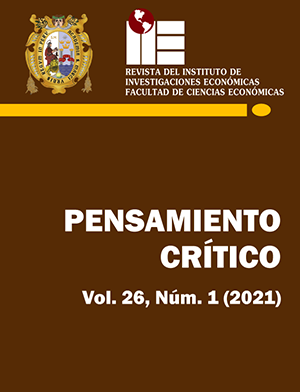Is there a consensus macroeconomy? The Post-keynesian criticism of the new consensus in macroeconomy
DOI:
https://doi.org/10.15381/pc.v26i1.20223Keywords:
General Aggregate Models, Keynes, Keynesians, PostKeynesians, Modern Monetary TheoryAbstract
Since the appearance of the Rational Expectations Hypothesis introduced in macroeconomics in the late 1970s and until the late twentieth century, tensions and disagreements among most economists were notable, as well as strong criticisms, referring to the futility or little meaning of the theories that were raised. However, there seems to have been progress towards a convergence in the way of conceptualizing macroeconomics and this has happened because the facts of the real world cannot be ignored. The beliefs shared by the majority of orthodox economists, have given rise to what today is the way of considering economic science from the perspective of the so-called New Keynesian Macroeconomics and its extension, the New Consensus Macroeconomics, which seems to have unified criteria and has allowed a useful convergence. The key to such convergence would be to accept, among other things, the existence of rigidities in both prices and nominal wages, that aggregate demand and supply are important to regulate economic activity, that there is imperfect competition in the market for goods and that economic policy should privilege the use of monetary policy, which should be aimed primarily at controlling inflation. However, a major current of economic thought, Post Keynesianism, disagrees with many of the approaches of New Consensus economists and has raised criticisms that deserve consideration. In fact, not all economists have converged or are converging, since there are important differences between the orthodoxy based on the New-Keynesian approach and Post-Keynesian heterodoxy.
Downloads
Published
Issue
Section
License
Copyright (c) 2021 Jorge Guillermo Osorio Vaccaro

This work is licensed under a Creative Commons Attribution-NonCommercial-ShareAlike 4.0 International License.
THE AUTHORS RETAIN THEIR RIGHTS:
a. The authors retain their trademark and patent rights, and also on any process or procedure described in the article.
b. The authors retain the right to share, copy, distribute, execute and publicly communicate the article published in Pensamiento Crítico (for example, place it in an institutional repository or publish it in a book), with recognition of its initial publication in Pensamiento Crítico.
c. The authors retain the right to make a subsequent publication of their work, to use the article or any part of it (for example: a compilation of their works, notes for conferences, thesis, or for a book), provided they indicate the source of publication (authors of the work, journal, volume, number and date).






